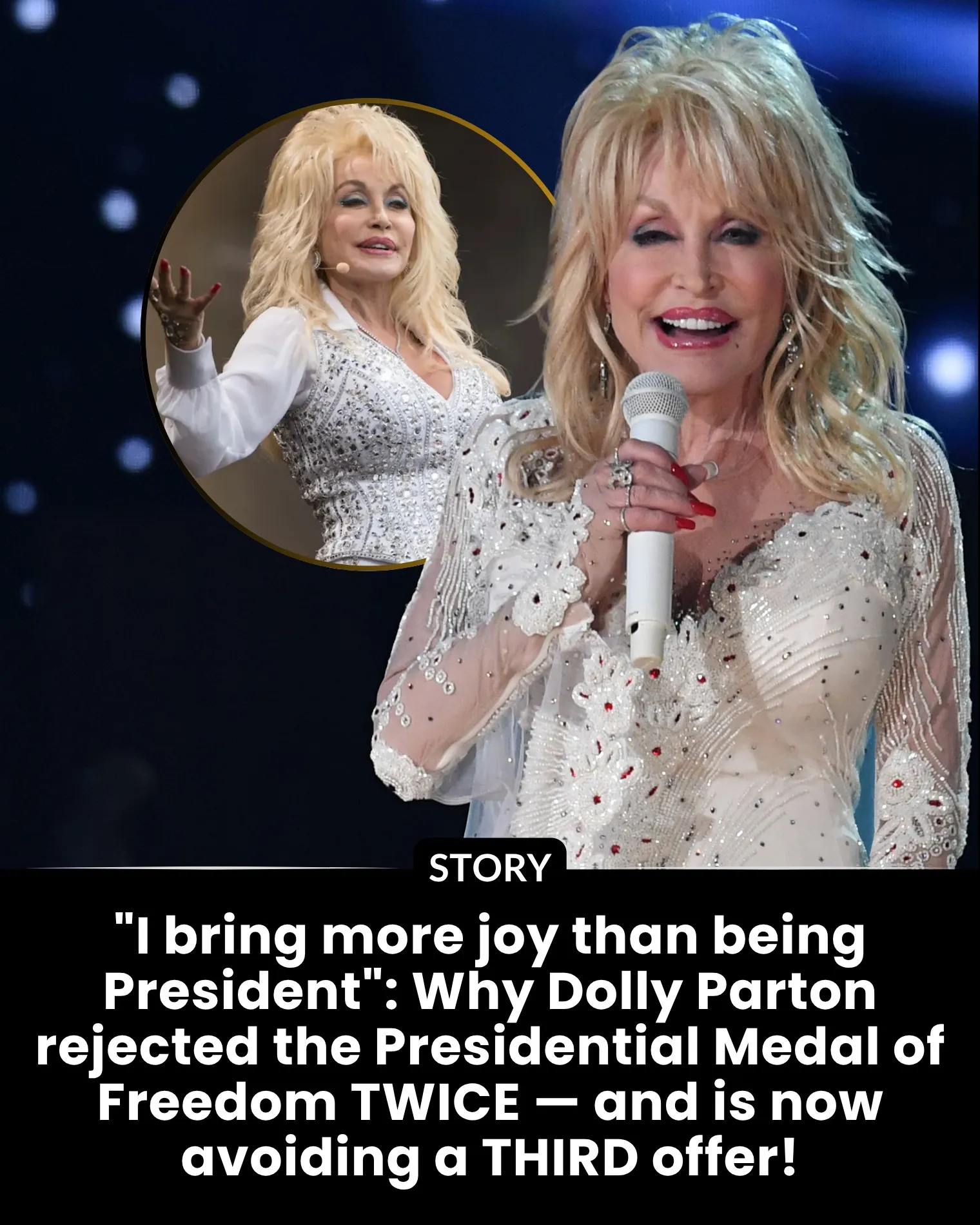Nashville, USA — November 2025
AN HONOR TURNED DOWN — THREE TIMES
Dolly Parton, one of America’s most beloved cultural figures, has declined the Presidential Medal of Freedom not once, not twice, but on the brink of a third offer. At 79, the country legend, philanthropist, and national symbol of generosity continues to inspire awe not only for her music but also for her moral clarity. Her refusal is surprising to many; after all, the Medal of Freedom is the highest civilian honor in the United States. Yet for Parton, the decision reflects a lifelong commitment to staying out of politics, maintaining humility, and protecting the trust she has built with millions of fans.
The revelation—originally shared during interviews following her philanthropic efforts during the COVID-19 era—has reignited public fascination. Although many celebrities pursue political prestige, Parton insists that she “brings more joy than being President” precisely because she doesn’t participate in politics. Her stance has become a cultural moment in itself: a reminder of her singular place in American life, where unity matters more than accolades.
FAMILY, PANDEMICS, AND THE FIRST REFUSALS
Dolly’s first two declines were rooted not in principle but circumstance. The first offer reportedly arrived during the Trump administration, around the time Parton’s husband, Carl Dean, faced significant health challenges. Between caring for her partner and maintaining an intense work schedule, Parton felt it inappropriate—not to mention impractical—to accept such a major recognition.
The second offer came during the height of the COVID-19 pandemic. By then, Dolly had become an unexpected hero of the scientific community after donating $1 million to Vanderbilt University Medical Center, contributing to the early development of the Moderna vaccine. Despite her monumental contribution, she refused the Medal a second time, explaining that accepting a high-profile honor during a global health crisis would be “bad optics” when so many were suffering.
In both cases, Dolly framed her decisions with characteristic grace. There was no political critique, no public drama—simply a desire to avoid attention that felt misaligned with the nation’s struggles. “I didn’t want to go because I didn’t want to be traveling during COVID,” she explained. “It just didn’t seem right.”

THE THIRD OFFER — AND WHY SHE’S AVOIDING IT
Now, according to Parton, a third offer has quietly surfaced. This time, however, her hesitation is less about timing and more about principle. After the polarized political landscape of the 2020s, Dolly fears that accepting the Medal—regardless of the administration—would drag her into the very world she has spent a lifetime avoiding.
“I don’t want to be doing politics,” she said simply when asked whether she would accept the honor on a third attempt. The comment was characteristically Dolly: honest, humorous, and delivered without malice. To her, the Presidential Medal of Freedom is not problematic; it is the political association that troubles her. As someone adored across party lines, she protects her neutrality fiercely.
In a culture where entertainers are increasingly expected to align publicly with political causes, Parton’s refusal stands out as both rare and refreshing. Her brand of unity—rooted in kindness, charity, and respect—relies on her ability to remain above political fray. Accepting a presidential award, even a symbolic one, risks unsettling that delicate balance.
A LEGACY OF APOLITICAL LEADERSHIP
Paradoxically, Dolly’s avoidance of politics has made her one of the most trusted public figures in America. Polls consistently show her with among the highest favorability ratings of any entertainer. Whether funding literacy programs through her Imagination Library, supporting hospitals, or contributing to disaster relief, Parton exerts an influence that feels political in effect but not in intention.
Her apolitical stance is not ignorance but strategy. Dolly grew up in rural Tennessee, a region shaped by religious conservatism, economic struggle, and cultural pride. As she rose to fame, she learned to navigate diverse audiences—southern churchgoers, LGBTQ+ communities, international fans—without alienating any of them. Rather than making statements, she leads through action. Rather than advocating for policy, she fights for people through philanthropy.
In an era defined by division, Dolly occupies a nearly mythical space: a figure who makes the world feel gentler simply by existing. This is why the comment “I bring more joy than being President” resonated so powerfully. For many, Dolly is a kind of ambassador—of compassion, humor, and generosity. Her refusal of the Medal, then, is less a rejection of honor and more an affirmation of identity.

WHY HER DECISION MATTERS
Parton’s reluctance invites a deeper question: what does it mean when one of the nation’s most cherished figures feels that even a symbolic government honor is too politically charged to accept? The answer reflects the cultural moment. Public trust in institutions remains volatile; celebrity influence often becomes weaponized; and even acts of recognition can carry ideological implications.
For Dolly, the calculation is simple: her mission is to uplift people through music and charity—not to participate in political theater. Ironically, this commitment to staying neutral has only increased her cultural power. By rejecting the Medal, she reinforces the very reason she was offered it: her profound impact on American life.
THE LEGEND WHO DIDN’T NEED A MEDAL
Whether Dolly Parton ultimately accepts a future offer remains unknown. But the story of her three refusals has already become part of her legend. It paints a portrait of a woman who understands her role in the world better than perhaps any public figure today. Her power comes not from titles or accolades, but from the trust she has earned—trust cultivated through half a century of empathy, humor, brilliance, and philanthropy.
In the end, Dolly Parton doesn’t need a Medal of Freedom to affirm her place in American culture. If anything, the honor seems too small for her. She already embodies its ideals every day: service, creativity, generosity, and an unwavering dedication to the people who love her.
And if she believes she “brings more joy than being President,” America seems to agree.
